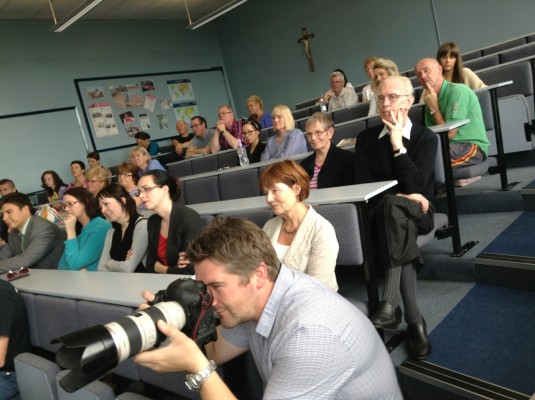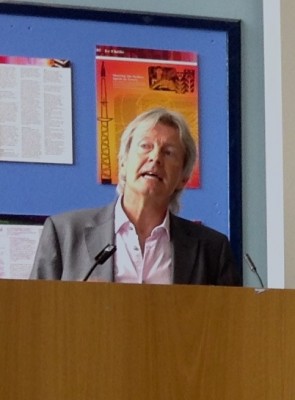Paul Tweed didn’t expect to still be in the legal profession with Johnstons thirty five years after graduating.
 He explained to the lunchtime Féile audience that it had all started in 1985 with the Cream Bun Case where two local senior counsels (including Bob McCartney) were wrongly reported as having fought over the last chocolate éclair in a Holywood cake shop. Libel action against the Sunday World report ended up being settled by a jury with £50,000 damages awarded to each. (You can read some more about it in his article in the Christmas 2012 edition of Northern Women!)
He explained to the lunchtime Féile audience that it had all started in 1985 with the Cream Bun Case where two local senior counsels (including Bob McCartney) were wrongly reported as having fought over the last chocolate éclair in a Holywood cake shop. Libel action against the Sunday World report ended up being settled by a jury with £50,000 damages awarded to each. (You can read some more about it in his article in the Christmas 2012 edition of Northern Women!)
The continual pattern over the years has been that one high profile case attracts the next – and the cream bun success attracted Barney Eastwood as a client in litigation against Barry McGuigan. In fact Johnstons now employ a PR firm to publicise their successes to maximise their reputation.
Johnstons expanded into multiple jurisdictions, with staff in Dublin and London as well as their larger Belfast office. While action will generally be initiated in the three jurisdictions, Paul Tweed currently prefers the “electorate-friendly regime” in Dublin where he pursues about 80% of cases. But the element of surprise can be important and he’ll switch to the court that offers the best chance of success on a case-by-case basis.
While it sounds like Paul Tweed and Johnstons have been involved with potential action against most local newspapers, he singled out the Irish News as being “first class” in its coverage of libel actions and decisions. In contrast, he felt that the Belfast Telegraph had until recently completely ignored him and snubbed potential stories about Hollywood stars jetting in for libel action. He’s noticed a U-turn with the Belfast Telegraph more recently running banner headlines proclaiming the need to change Northern Ireland’s “archaic” libel laws and running counterfactual pieces penned by him alongside their articles.
 The National Enquirer had never published an apology until Tweed took up a case in 2006 for Britney Spears. The internet has changed the world of libel, making it straightforward to show that a defamatory article from a American or global publication is available to read online in other jurisdictions (like Belfast, Dublin and London) well away from US First Amendment freedom of speech protection.
The National Enquirer had never published an apology until Tweed took up a case in 2006 for Britney Spears. The internet has changed the world of libel, making it straightforward to show that a defamatory article from a American or global publication is available to read online in other jurisdictions (like Belfast, Dublin and London) well away from US First Amendment freedom of speech protection.
Yet in the Britney Spears case, Paul Tweed realised that the internet allowed the National Enquirer’s apology to bounce around the world in minutes. The fact that the apology was not won in a US court no longer limited the reporting of the victory and the potential redress for a client.
Surprisingly, while media organisation are often the target of libel action, the single biggest group of Tweed’s clients are journalists, followed by lawyers and then politicians. Celebrities are far down the list.
Paul Tweed explained that journalists often come under attack from bloggers and online commenters who take exception to what has been published and make defamatory comments about the journalist.
It’s not all about money. Often complainants are simply seeking an apology. His busy days are Friday, Saturday and Sunday.
 During his talk he touched on super-injunctions and talked about their use (and the potential to avoid needing them) in genuine cases where there was threat to life or children’s interests were at stake.
During his talk he touched on super-injunctions and talked about their use (and the potential to avoid needing them) in genuine cases where there was threat to life or children’s interests were at stake.
While the Sun newspaper only gave four hours notice that it was going to publish an ultimately proven-to-be-fabricated story about Louis Walsh, it took eighteen months for Paul Tweed to resolve the case and get damages. So he questions the calls to bring in the tighter ‘English’ defamation legislation that will make it ever more difficult to take action. [A recent article by Paul Tweed in the Belfast Telegraph expands on his arguments against extending the legislation.] Libel action is not covered by Legal Aid, and no-win-no-fee cannot be used in Northern Ireland or the Republic of Ireland, so the barrier of entry for people on average salaries to pursue libel action is high. Many cases seem to be abandoned due to mounting financial costs.
Changing the libel law in Northern Ireland won’t affect Paul Tweed or Johnston’ business. They’ll continue to work in multiple jurisdictions. But it’ll make it a lot harder for some people to avail of the justice they deserve.
The talk was followed by a Q&A.
I left St Mary’s college with the impression that despite his affable nature, it should be a lifetime ambition not to find myself opening a letter or reading an email signed by Paul Tweed.
Alan Meban. Tweets as @alaninbelfast. Blogs about cinema and theatre over at Alan in Belfast. A freelancer who writes about, reports from, live-tweets and live-streams civic, academic and political events and conferences. He delivers social media training/coaching; produces podcasts and radio programmes; is a FactCheckNI director; a member of Ofcom’s Advisory Committee for Northern Ireland; and a member of the Corrymeela Community.
Discover more from Slugger O'Toole
Subscribe to get the latest posts to your email.
